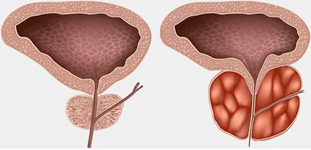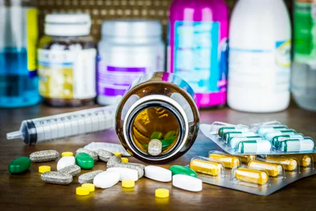
In the treatment of prostatitis, drug therapy is most often prescribed. During the passage, the patient must take drugs of various categories. Some are designed to eliminate symptoms that lead to discomfort, while others target the affected gland directly and eliminate the most important thing - the root cause. At the same time, drugs differ in the strength of the effect, since some are intended to eliminate acute, while others are against chronic. Let's take a look at the most popular drugs used to treat prostate inflammation.
Types of drugs for prostatitis
All medicines prescribed by the attending physician can be roughly divided into several categories depending on the type of application:
- Tablets and capsules- taken orally, moderately absorbed by the body, with capsules the absorption is much faster, as all components reach their destination after a short time after the gelatin shell has dissolved.
- Injections- Both liquid and powdery preparations can be used, which are then diluted in a working fluid, usually an anesthetic, administered intramuscularly or intravenously. The effect can be felt after a few minutes. . .
- Rectal suppositories (suppositories)- have anti-inflammatory, antibacterial and analgesic effects, are administered to the patient in the rectum when he is on his side, and in this position he must spend about half an hour, so that the drug is completely dissolved and absorbed.
- Instillations- a group of drugs that only have the maximum positive effect when delivered directly to the area of the affected prostate. The method is used in a hospital because it is introduced through the urethra.
- Microclysters- These usually include non-medicinal drugs, e. g. B. Herbal Cooking. They cannot replace drug therapy, but they can be a good means of pain relief or prevention.

It should be noted that some types of drugs can be sold in different forms at the same time, e. g. B. tablets and suppositories. The attending physician must therefore state this property.
The most popular drugs for the treatment of prostatitis
Treatment of prostatitis with drugs is a rather complicated procedure, which requires the doctor to choose the right drugs that will not only relieve pain and eliminate other symptoms with manifestations, but also eliminate the root cause of the disease. The disease itself can also have some other origin, manifest itself in acute or chronic forms, and cause the patient a wide variety of inconveniences, both limiting him in natural matters and leading to complete infertility.
Classic tablets, intramuscular injections, and suppositories for rectal administration can be used to treat prostatitis. The choice of a drug depends directly on the need to urgently deliver its components to the affected organ.
Additional tools
Treatment of prostatitis is not limited to a list of several drugs. Specialists can also use other types of drugs of different categories.
Fluoroquinolones
Fluoroquinolones are antibacterial drugs used to treat the tubercular origin of prostatitis. These funds are used in a complex way, and the patient can be prescribed a course consisting of four or more drugs at the same time.
Cephalosporins
Cephalosporins are antimicrobial drugs that target certain types of bacteria.
Such drugs can have both a broad and directional spectrum of action, and the need to use this or that remedy directly depends on the form of the disease and the cause of its occurrence.
Macrolide
Macrolides are rarely used in the treatment of prostatitis because they are thought to fight certain types of bacteria such as mycoplasma and chlamydia. By the way, such a disease as chlamydia is often accompanied by prostatitis. Therefore, doctors will prescribe multiple tests at the same time to identify problems with the prostate in its early stages.
With acute manifestations of prostatitis, the attending physician can prescribe several drugs of different categories at the same time. This approach allows you to effectively treat both the symptoms and the disease itself.
Analgesics
The vast majority of analgesics are prescribed for acute pain syndrome, which is an essential companion of chronic, but more often worsened, prostatitis. The use of drugs of this group outside the framework of drug therapy to get rid of the disease is strictly not recommended, as the body quickly gets used to them. To achieve an analgesic effect, it is necessary to increase the dose, which can negatively affect the liver and kidneys. The course of analgesics is prescribed individually.
Alpha blockers and muscle relaxants
The main task of these drug groups is to relieve tension in the spasmodic muscles of the bladder and urethral canal and to reduce pressure in the pelvic area. These funds will help get rid of the feeling of discomfort and normalize the process of urination.
Immunomodulators
Such preparations essentially contain natural ingredients for prostatitis - extracts based on the tissue of the prostate of cattle. Regardless of the drug, they all have a common principle of action that enables the following:
- , to slow down the course of inflammatory processes;
- increases the tone of the smooth muscles and the walls of the bladder;
- to minimize the possibility of blood clots;
- improves blood flow to the prostate;
- reduces the prostate volume.
Immunomodulators can be used for a number of diseases including chronic prostatitis, acute non-infectious prostatitis and prostate adenoma.
In addition, such funds are actively used for prophylactic purposes, avoiding the occurrence of the disease or its relapse.
Vitamins and dietary supplements
Remedies that fall into these categories can reduce inflammation, improve fluid drainage, and clear congestion. The need for such drugs is also due to the insufficient absorption of useful nutrients in the body, especially in the course of antibiotics.
Prostatitis is quite a complex disease that only a real specialist should deal with. Self-selection of drugs is strictly not recommended, as this approach increases a large part of the likelihood of complications in the form of infertility, impotence, and even the risk of cancer. The use of drugs for prostatitis without consulting a doctor can make it impossible to get rid of the disease without surgery. In addition, the impossibility of an accurate diagnosis makes self-treatment difficult, as it requires the appropriate equipment and knowledge.
It should also be noted that most drugs used to treat prostatitis are quite toxic and some types are simply not compatible. If you experience pain in the pelvic area when urinating, defecating, or ejaculating, then using the bathroom frequently and being unable to empty your bladder normally. Don't risk this - contact your doctor. Thus, you will not only prevent the unfavorable course of the disease, but also avoid the development of its chronic form, which you will have to live with all your life. In addition, your sexual function will not be affected and, with timely treatment, you can have completely normal and healthy offspring.


























